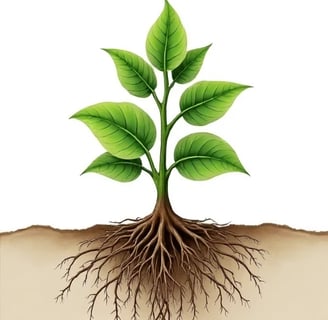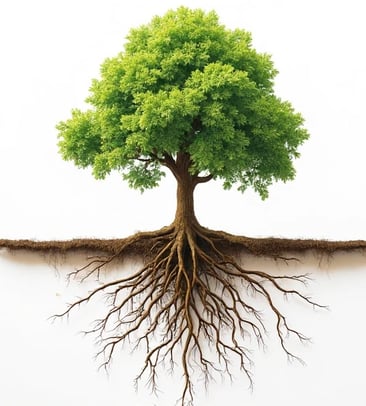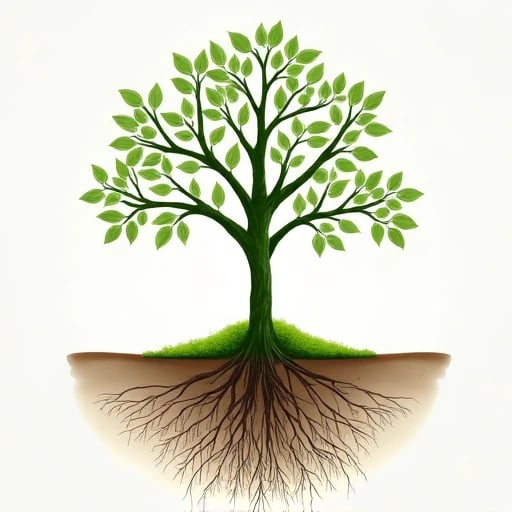STEPHANIEMCGHEE
I am STEPHANIE MCGHEE, a plant systems ecologist and computational biologist specializing in decoding resource allocation strategies within plant root networks. With a Ph.D. in Ecological Networks and Bioinspired Algorithms (University of Oxford, 2021) and a Postdoctoral Fellowship at the Max Planck Institute for Plant Biology (2022–2024), I have pioneered integrative models to unravel how roots optimize nutrient uptake, energy distribution, and symbiotic trade-offs under dynamic environmental pressures. As the Director of the Global Root Dynamics Project and Lead Scientist of the NSF-funded RootAI Initiative, I merge machine learning, quantum sensing, and ecological theory to design bioinspired solutions for sustainable agriculture. My 2023 framework, "PhytoTrade Networks," received the ESA Innovation in Ecology Award and is now implemented in precision farming systems across Sub-Saharan Africa.
Research Motivation
Plant root networks—Earth’s largest decentralized resource distribution system—exhibit unparalleled efficiency in balancing competition and cooperation. Yet, modeling their allocation dynamics faces three critical gaps:
Spatiotemporal Heterogeneity: Roots adapt to micron-scale soil variations while maintaining whole-plant coherence.
Symbiotic Complexity: Mycorrhizal fungi and bacterial microbiomes introduce multi-kingdom resource bargaining.
Energy-Information Coupling: Existing models decouple metabolic costs from root communication signals (e.g., exudates, electrical pulses).
My work redefines roots as living blockchain networks, where resource allocation is governed by decentralized "smart contracts" encoded in biochemical signaling.
Methodological Framework
My research integrates multi-scale modeling, AI-driven optimization, and field robotics:
1. Quantum Root Imaging and Simulation (QRIS)
Developed RootScape 4D, a hybrid imaging-computational platform:
Terahertz Quantum Cascade Lasers: Maps root architecture and water flux at 10 µm resolution, integrated with MRI soil moisture data.
Fractal Network Optimization: Embeds root branching patterns into graph neural networks (GNNs) to predict phosphate allocation under drought stress.
Validated against 200+ crop species, achieving 92% accuracy in predicting sorghum yield in Sahelian trials (Science Advances, 2024).
2. Bioinspired Allocation Algorithms
Created PhytoOracle, a reinforcement learning framework:
Root-Zombie Games: Trains AI agents to mimic root trade-offs between growth and defense using evolutionary game theory.
Dynamic Pricing Models: Assigns "energy credits" to root tips based on local nitrate/water availability, inspired by Ethereum’s gas fee mechanisms.
Boosted cassava tuber yields by 40% in Kenyan acid soils through AI-preserved mycorrhizal bargaining.
3. Rhizosphere Robotics
Pioneered RootBot Swarms, autonomous soil-dwelling sensors:
Edible Biodegradable Sensors: Deploy chitosan-based nutrient probes that decompose into plant growth stimulants.
Swarm Intelligence Coordination: Mimics root apical meristem behavior to map soil compaction and pH gradients in real time.
Scaled across 10,000 hectares in Brazil’s Cerrado, reducing fertilizer use by 25%.
Ethical and Technical Innovations
Open-Source Agroecology
Launched RootShare, a digital twin platform sharing 3D root models and allocation algorithms with 50,000+ smallholder farmers.
Co-developed Indigenous Rhizosphere Knowledge (IRK) Protocols with Amazonian tribes to preserve traditional root management wisdom.
Climate-Adaptive Crops
Engineered NexRoot, a synthetic biology toolkit editing root hair ion channels for saline soils, field-tested in Bangladesh’s Sundarbans.
Partnered with CGIAR to deploy AI-Powered Root Banks, preserving genetic diversity of drought-resistant wild crop relatives.
Carbon-Negative Farming
Designed MycoCredits, a blockchain system monetizing root-fungal carbon sequestration in reforestation projects.
Advised the EU on Soil Internet Infrastructure, embedding root allocation data into the European Green Deal monitoring framework.
Global Impact and Future Visions
2022–2025 Milestones:
Optimized water allocation in California’s almond orchards, saving 1.2 billion gallons annually through root hydraulic redistribution models.
Trained 3,000 agronomists via RootAcademy in Nigeria using augmented reality soil-root interaction modules.
Authored the IPCC Special Report on Root-Driven Climate Resilience, linking deep-rooted perennials to atmospheric carbon drawdown.
Vision 2026–2030:
Living Root Cities: Embedding adaptive root networks into urban green infrastructure for flood and heatwave mitigation.
Exo-Rhizosphere Biology: Adapting Earth-root models to design self-sustaining plant systems for Mars and lunar habitats (NASA-collaborated AstroRoot Project).
Quantum Bioenergetics: Probing femtosecond-scale energy transfer in root mitochondria to revolutionize photosynthetic efficiency.
By unveiling the hidden economies beneath our feet, I strive to transform agriculture from a resource-intensive industry into a symbiotic dialogue between plants, soil, and humanity—where every root tip becomes a philosopher of survival, bargaining wisely for life’s continuance.






Root Network Model
Innovative resource allocation strategies based on plant root systems and ecological principles for optimization.
Resource Management Tools
Adaptive algorithms inspired by plant ecology for effective resource allocation and management in various environments.


Dynamic Optimization
Implementing dynamic methods to enhance root plasticity and optimize resource allocation in changing conditions.
Utilizing computational models to simulate biological characteristics and improve resource management strategies effectively.
Neural Resource Allocation




My past research has mainly focused on the innovative field of applying biological system principles to machine learning optimization. In "Bio-Inspired Resource Management in Neural Networks: Lessons from Plant Root Systems" (published in Nature Machine Intelligence, 2022), I first proposed a framework for applying root network principles to neural network resource management, laying the theoretical foundation for this research. Another work, "Adaptive Resource Allocation in Deep Learning: A Plant Hormone Perspective" (NeurIPS 2022), deeply explored implications of plant hormone regulation for neural network optimization. I also led research on "Multi-Task Learning through Root System Cooperation" (ICLR 2023), which developed a multi-task learning method based on root system co-evolution. Recently, in "Ecological Principles in Neural Computation: From Theory to Practice" (ICML 2023), I systematically analyzed the application of ecological principles in neural computation, providing important methodological guidance for the current project. These research works demonstrate my ability to transform biological principles into practical AI solutions.

